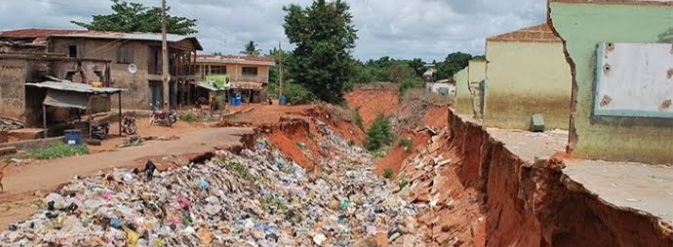The world is blessed with natural and mineral resources, but exploitation of these resources has led to extreme pollution of the environment. Population growth and urbanization due to developments have also contributed immensely to the current pollution globally. Traffic emissions, transported dust and open burning are all significant contributors to air pollution around the world. The Sahara desert is a major source of transported dust, especially during the harmattan season in West Africa. Mercury emissions are very high in South Africa due to coal combustion and gold mining. Air pollutants may contaminate water and soil through atmospheric deposition. However, the major pollution sources for surface waters are the urban and industrial discharges of untreated effluents into the water. A few African countries have standards for effluent discharge into surface waters, but it is unknown whether these standards are being enforced. Though groundwater sources in wells and boreholes are the major sources of drinking water for the African populace, the biological water quality of these groundwater sources is mostly low in the region due to close proximity to sanitary facilities. Identified sources of soil pollution in Africa include agricultural activities, mining, roadside emissions, auto-mechanic workshops, refuse dumps and e-waste.
Oil spills are a major problem in oil-rich African countries such as Nigeria and Angola. Agricultural activities are the lowest impacting the soil in Africa
The role of citizens on environmental degradation can vary greatly depending on their actions and choices. Here are some ways in which citizens can contribute to environmental degradation:
Over consumption: Citizens play a significant role in environmental degradation through overconsumption of natural resources. The demand for products and services can lead to excessive extraction of resources, deforestation, and habitat destruction.
Waste generation: Citizens contribute to environmental degradation by generating large amounts of waste. Improper disposal of waste, such as littering or illegal dumping, can pollute land, waterways, and air.
Energy consumption: Citizens are responsible for energy consumption in households, transportation, and industrial activities. Overreliance on fossil fuels and inefficient energy use contribute to greenhouse gas emissions and climate change.
Pollution: Individual actions, such as using harmful chemicals, pesticides, or fertilizers, can contaminate water bodies and soil, leading to pollution. Additionally, personal choices related to transportation, such as using private vehicles instead of public transportation, can increase air pollution.
Lack of awareness and education: Citizens who are uninformed or unaware of the environmental consequences of their actions may inadvertently contribute to environmental degradation. Lack of knowledge about sustainable practices and alternatives can hinder positive environmental behavior.
However, citizens also have the power to mitigate environmental degradation:
Sustainable practices: Citizens can adopt sustainable practices, such as reducing energy and water consumption, recycling and reducing waste, and choosing environmentally-friendly products. These actions help reduce the pressure on natural resources, conserve energy, and minimize pollution.
Advocacy and activism: Citizens can play a crucial role in raising awareness and advocating for environmentally-friendly policies and practices. This can involve engaging in protests, petitions, or lobbying efforts to promote sustainability and hold governments and corporations accountable.
Community involvement: Citizens can actively participate in community-based initiatives, such as tree planting, clean-up drives, or conservation projects. Collaborating with local organizations and engaging in environmental volunteering activities helps protect ecosystems and enhance local sustainability.
Education and awareness: Citizens can educate themselves and others about environmental issues, encouraging sustainable behavior. By staying informed about climate change, pollution, and conservation, citizens can make informed decisions that contribute to environmental protection.
Responsible consumer choices: Citizens can vote with their wallets by supporting companies that prioritize sustainability and environmentally-friendly practices. This can influence businesses to adopt more sustainable practices and reduce their environmental impact.
Overall, citizens have the ability to either contribute to environmental degradation or play an active role in its mitigation and prevention. With the right choices and actions, individuals can contribute to a more sustainable and environmentally-friendly future.
How to curb the menace
Increase awareness and education: Educate individuals and communities about the importance of the environment and the consequences of environmental degradation. This can be done through schools, media campaigns, and community events.
Promote sustainable practices: Encourage individuals, businesses, and governments to adopt sustainable practices. This includes reducing waste, conserving water and energy, and promoting renewable energy sources.
Regulate and enforce environmental laws: Implement and enforce strict regulations to prevent pollution and promote the sustainable use of resources. This includes enforcing laws against illegal logging, pollution, and wildlife trafficking.
Support reforestation and habitat restoration: Invest in programs that restore damaged ecosystems and protect biodiversity. This includes planting trees, restoring wetlands and coral reefs, and protecting endangered species.
Encourage responsible consumption and production: Promote responsible consumption by reducing waste and promoting recycling and reuse. Encourage sustainable production practices that minimize the use of resources and reduce pollution.
Support renewable energy: Invest in renewable energy sources such as solar, wind, and hydroelectric power to reduce reliance on fossil fuels and decrease greenhouse gas emissions.
Encourage international cooperation: Collaborate with other countries and international organizations to address global environmental challenges. This includes sharing best practices, promoting sustainable development, and supporting international agreements such as the Paris Agreement.
Foster community involvement: Engage local communities in environmental conservation efforts. This can be done through volunteer programs, community gardens, and local environmental projects.
Support sustainable agriculture: Promote sustainable agricultural practices that minimize the use of chemicals, conserve water, and protect soil health. This includes promoting organic farming, agroforestry, and regenerative agriculture.
Invest in research and innovation: Support research and development of new technologies and practices that promote environmental sustainability. This includes investing in green technologies, sustainable materials, and eco-friendly infrastructure.
Overall, ending environmental degradation requires a multi-faceted approach involving education, regulation, community involvement, and international cooperation. It requires a shift towards sustainable practices and a collective effort to protect and restore the environment for future generations.
END
Project sponsored by Zenith Global Media Services & Consultancy
